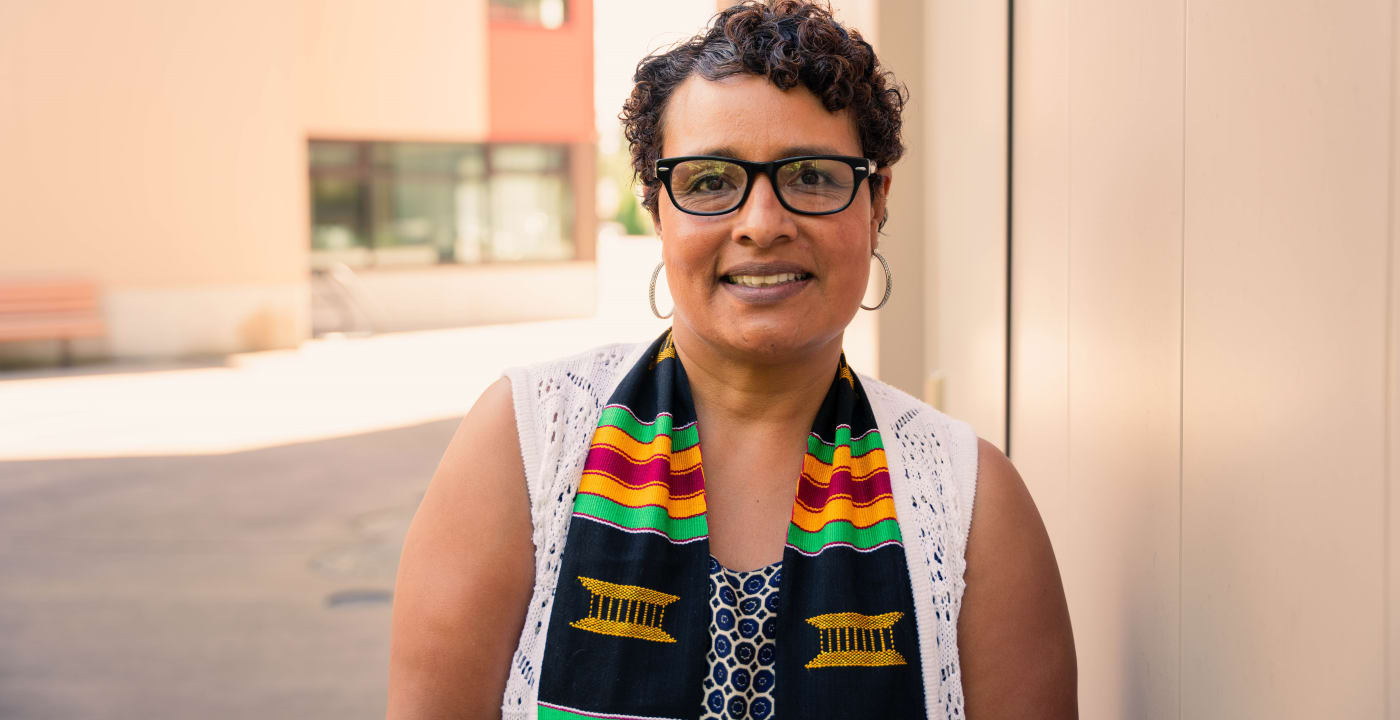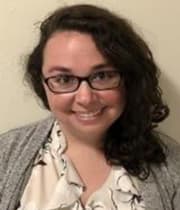Navos staff share their stories during BIPOC Mental Health Month

Part two: Meet Alice, Dumbe and Maeisha
BIPOC Mental Health Month is all about destigmatizing mental health illnesses and elevating voices within these communities. (BIPOC stands for Black, Indigenous and people of color.) Below are just a few such leaders at Navos who are moving the needle by promoting the mental health and well-being of all King County residents.
At Navos, care is grounded in cultural competence, aiming to be respectful and inclusive of the beliefs, attitudes, healing practices and cultural and linguistic needs of everyone who comes to the nonprofit’s doors.
Alice Ongom, case aide

Alice in front of Navos client housing.
Alice Ongom, a Navos case aide, grew up in Uganda, East Africa, and worked as a secretary at military headquarters. Between war and subsequent political shifts, she was ousted from her job and escorted home by armed soldiers. Fearing for her and her family’s life, she fled to Kenya. When it was discovered she was previously employed by the Ugandan government, she sought asylum at the U.S. Embassy. On March 11, 1991, she landed in Seattle.
In King County, Alice began life anew, attending college classes to become a chemical dependency professional. Through her passion for helping others, Alice learned about Navos. She’s been on the Program of Assertive Community Treatment team and then the Intensive Community Support and Recovery Program (ICSRP) team for 13 years.
“I came to Navos to give help to the client, and then I wanted to know how mental health affects the people,” she says. “Before I worked with mental health in Expanded Community Services (now ICSRP), I didn’t understand because in Africa, even if somebody is having mental health problems, they don’t let it be known.”
By sharing her own story and understanding the nuanced cultural stigma surrounding mental health, Alice connects on a deeper level, providing culturally competent care.
Dumbe Elessa, program manager
Born in Cameroon, Central Africa, Dumbe Elessa attended commercial grammar school and worked at the justice department. He was planning on a corporate law career when an eye problem developed, rendering him legally blind.
“I was qualified to go to university for free in Cameroon; however, there were no amenities for people who were visually challenged,” he says. “So, I came to the United States, and my undergrad was in sociology. I then became licensed as a clinical social worker.”
Dumbe’s next chapter includes 33 years at Navos. He started as a therapist, developed the program for Navos’ first nursing home and became a program manager for Older Adult Services and Information System (OASIS). This role maintains relationships between OASIS facilities and community partners to offer comprehensive services to seniors.
As for his mental health philosophy, Dumbe says, “I’ve derived and verified that every problem with behavior is a symptom of an unmet need. They’re in their own world, and they’re trying to find meaning. We have to find them, meet them where they are and see if we can hold their hand.”
And when it comes to serving BIPOC older adults, he begins by building trust.
“There’s history where services have been used as a means of experimentation, so there can be legitimate distrust,” Dumbe explains. “They may need representation to help the distrust. It requires patience, conversation, empathy and relentless support to bring trust back.”
Maeisha Stensen, case manager

Maeisha and her grandmother.
Maeisha Stensen spent her childhood in a Chicago, Illinois, housing project during a surge of drug and gang activity. From age 7 to 10, she was in the foster care system. Then her grandmother came into the picture.
“My passion for mental health comes from my grandmother,” Maeisha shares. “As the first Black female assistant pastor at Shiloh Baptist Church, she worked diligently in the Black community with the homeless, prayed with patients and worked daily at her church soup kitchen.”
Maeisha is also Mexican American and participates in programs run by the city of Seattle to combat systemic inequality.
Advocacy is also featured heavily in her case manager role at ICSRP, where she helps adults in an independent living setting by coordinating treatment plans and resources, offering mental illness education and bringing in mental health professionals or crisis services, when needed.
For BIPOC clients, Maiesha hopes to stop the cycle of mental health discrimination, paving the way for better, more accessible care.
“Historically Black communities are affected by discrimination in the health care field,” she writes. “They’re less likely to receive access to medical care. There’s misdiagnosing, and some doctors have a bias that Afro Americans don’t have mental health. We should be educating doctors on Black communities and mental health. We need to provide full access to health care and have open discussions.”
Ensuring mental health access for everyone can’t happen without donor support. Many who need this safe, inclusive care face economic barriers, such as being underinsured. Yet the MultiCare Behavioral Health Network, powered by the MultiCare Behavioral Health Foundation (MBHF), strives to provide access for all.
You can further Alice, Dumbe and Maiesha’s critical work of providing culturally appropriate prevention, outreach, assessment and intervention. Your donation to MBHF will help every individual who comes to Navos manage their mental health challenges and lead meaningful lives.




